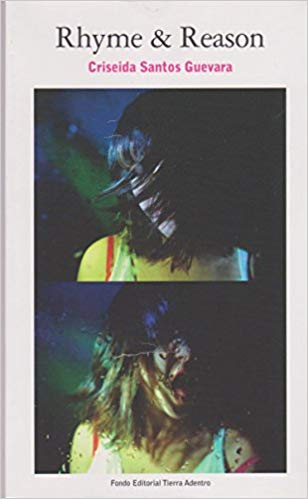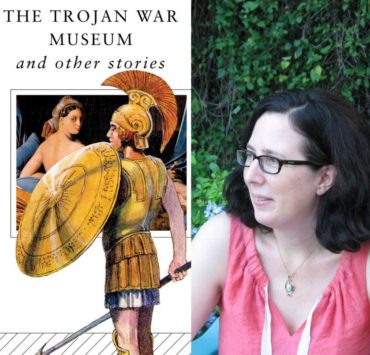
Translated from the Spanish by Amira Plascencia-Vela
There’s a song stuck in my head, and I can’t get it out. Every so often, time flies when I listen to it, and I imagine I’m the writer. Well, it happens with a lot of songs. But it happens more with this one. It’s like… like when you want to do something for someone and you say, you think, this can’t be just a song, or a letter, or a painting, or a statue, or a beautiful bridge, you know what I mean? “Quisieras fuera una declaración de amor romántica sin reparar en formas tales.” See? It happens when I listen to it, when I feel like I’m a poet and I want to write, or when I want to say something intense, something about love, “de amores, de amores, eternamente de amores.” But then, I remember. I realize it’s already been said. And I give up. I let other people’s words win, and I only listen to them looking for a new voice. Not my own voice, though. And that’s not right, they say. It’s not right to think someone else will say what you’ve got to say. So, I’m saying it now. I’m telling you. I’ve got to get this off my chest. Hands tied. This is the story of my life, as the Smiths say, “Call me morbid, call me pale, I’ve spent six years on your trail, six long years on your trail.” Have you heard that one? “And if you have five seconds to spare, then I’ll tell you the story of my life: sixteen, clumsy and shy.” We’re all the same. Don’t you think? Or, do you know anyone who remembers their teenage years, in high school or middle school, as a moment of great clarity? Of course, over time, you give up and accept how you used to be; how your body used to be, how your personality used to be, how your mojo—or your lack of it—used to be. Crooked teeth, or spiky hair, or a huge head on top of a scrawny body, or that damn baby fat that just won’t go away.
I’ve thought many times—in those unusual moments when I look inward and try to see myself—there’s no one like me. Just like me. Someone who speaks like me. Someone who likes the same things I do. Someone who dares and does whatever comes to mind. Someone who gets stressed about politics and law, and cares about making the world a better place. Someone who fights—but for real—and suffers, not like my classmates—those assholes from college. They used to care, but they don’t anymore. They were the pull-an-all-nighter-hippies; the Che Guevara and Marcos groupies who spent their free time collecting signatures for Amnesty International and sent stupid emails for some Greenpeace campaign. But now they have bushy mustaches, and fat bellies, and perfect nip-and-tuck faces, or huge butts. They leave their lights on “because they can pay,” and they don’t give a damn about saving water. They wash their fancy cars with hoses and soak the sidewalks, too. Of course, in the past they swore—with pinky fingers—they’d change the world. They’d faithfully use public transportation and carpool—so much bullshit buried in a forgotten corner of their memories. Their good intentions banished the moment they gave in to the irresistible capitalistic charms of buying and competition, those despicable traits our parents showed us back then, and we thought they were older people’s faults we had to fight and get rid of.
No, I don’t think there’s someone like me. Someone who speaks properly at first, but suddenly feels uncomfortable and starts swearing and making rude remarks. Someone who suddenly adopts another register and speaks a fusion of hood slang and the voice of a character in a book. Someone with that snarky, deceiving, even fake, language. Those rambling words, so far from reality, so inappropriate for a thirty-year-old woman like me, with a broad repertoire of curses and profanities that seem out of their natural habitat (the profanities, obviously). Because everybody would think that a woman like me would speak like an average professional woman portraying a delightful conversation about jobs, and routines, and makeup, and glitter, and children, and husbands. Or if we’d like to think about me in a different way, then I’d be a liberal single woman having quite long, obsessive conversations about cocks, fluids, sweats, sexual dissatisfactions, war of the sexes, and an arsenal of reasons to justify why I’m still single; the fact of being intelligent would be the most obvious one, right? The drama of many untamed beasts; the story of the enchanted princess—sick of kissing toads— locked up inside a tower, victim of the witch (cackle, cackle) whose only task in this world is to screw with the mental peace of the milky blonde—or brunette, in a Pocahontas style—heroine of our tale. I should be talking like Carrie Bradshaw, or at least like Monica Braun, “if you don’t own your body, your sex, and your pleasure, you’re fucked up.” Or “a woman needs a man that does not feel intimidated by a liberated woman, a man with whom the female gender may feel weak.” Or some pendejada.
But no, there isn’t anyone like me; as violent as me, with all these ideas of violence, thoughts of violence, or rather violent fantasies, such as that one where I take a gun, get on a bus, and point the gun at the bus driver and I shout—making my lungs blow up—all kind of things related to this wonderful sexual universe, “Go fuck your mother! You must have a tiny dick, huh? Goddamn fag! Suck my pussy while I’m on the rag.” Or something similar. I’d be shouting to the point of making my veins pop out my temple just because I like to mess around, see? “But it’s just me, I’m just obscene.” My personality is like a test tube that mixes inside it a great deal of disappointment with Morrissey’s superior linguistic talents, “Why do I give valuable time to people who don’t care if I live or die?” Or with Eminem’s words spit on your face —with his most depraved and inappropriate metaphors— “You’re a fuckin’ cock-head slut, I hope you fuckin’ die, I hope you get to hell and Satan sticks a needle in your eye, I hate your fuckin’ guts you fuckin’ slut, I hope you die. Die.” Or with 50 Cent’s coolness and conviction, “Look baby this is simple, you can’t see, you fucking with me, you fucking with a P.I.M.P.” Or with America Ochoa’s words (A.K.A. Ms. Krazie), “no tengo miedo de una puta niña fresa y escuchando tú mis rimas, yo, te rompen la cabeza, yo sí escribo mis canciones, no como una principiante, contéstame cabrona, es lo que quiero, adelante.” Again, think in a test tube and mix inside it a great deal of aggressiveness and resentment, a lot of repressions, poverty, education, and plenty of dreams and promises that would not come through. Life’s a bitch. But that’s me. It’s not “I don’t care about life”, but “me vale madres.” Anyway, such is life. Just when one thinks, “I’m on a roll. I get it now. I’ve got my shit together. Nobody has done this before,” there’s evidence proving it’s been done already. Thousands of written pages and forgotten book stacks attest to it, tracing back resembling worries, and I could tell they have the same origin. Or, what about when you say, “I’m going to tell you a story,” and you think, “I know nobody’s been there, done that.” But then, while surfing the Internet, you find someone else’s blog describing the same shit, la misma puta cosa, as Mijares would sing, “esta misma historia continua, sólo cambia de escenario.” That’s the moment when you feel short of breath, gasping, with no strength to keep on fighting. A punch in the stomach makes you see that everything’s been said, although not everybody grasps it. But even after this realization hits you, there comes an enlightening moment, and that’s when you think, all of a sudden, “Heck, wait! Not all is lost. What’s important today is to be seen, to be on stage, to perform.” So, you get to a bar (not too cheap, not too expensive), sit down with an old friend, and ask him to get you a beer (to warm you up). There you are, excited and filling the hours talking; a thousand stories come back and forth between you two over the late hours, until he asks you to go home with him, and you accept because you don’t know where you’re spending the night. Taking some advantage, you ask him to get you a new drink (to warm you up). You get comfortable and plop down in a puff feeling all V.I.P., and you start blabbing your unvarnished truth. Because truths become lies and lies become truths, in the end, all is the same. Es la misma gata revolcada.
Criseida Santos-Guevara is a México-U.S border writer. She received Honorable Mention in the Binational Young Novel Frontera de Palabras / Border of Words Award in 2008 with Rhyme & Reason (Conaculta 2008). Also, she is the winner of the 2013 Literal Novel Prize with La reinita pop no ha muerto / The Little Queen of Pop in not Dead (Conaculta / Literal Publishing 2013).She holds an MFA in Creative Writing from the University of Texas at El Paso. She is currently studying Hispanic Studies with an emphasis on creative writing at the University of Houston.
Quoted songs in this chapter: “Yolanda” (1970) by Pablo Milanés; “Half a Person” (1998) by The Smiths; “Without Me” (2002) by Eminem; “Heaven Knows I’m Miserable Now” (1984) by The Smiths; “Puke” (2004) by Eminem; “P.I.M.P” (2003) by 50 Cent; “From the Throne” (2010) by Ms. Krazie; “No hace falta que lo digas,” lyrics by Alejandro Lerner, singer Manuel Mijares.
Special thanks to Samantha Schnee, Stalina Villarreal, and the 2019 Kenyon Review Summer Writers’ Workshops; the Translation Workshop directed by Elizabeth Lowe and Katherine Hedeen made this work possible.

Amira Plascencia-Vela is an independent translator and researcher. She has taught Spanish Language and Translation at college level in the United States, Canada, and Mexico. She has translated Children’s Books from English into Spanish; “Rhyme and Reason” is her first attempt to translate a literary work from Spanish into English. She has a Ph.D. in Hispanic Studies from the University of Houston.







